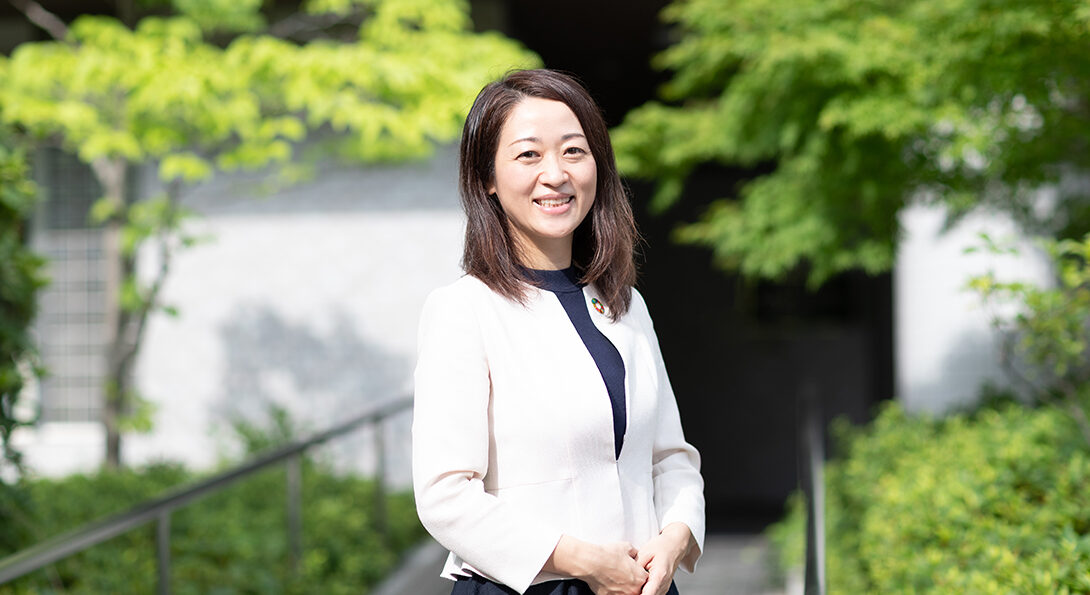UIC Nursing Alumni–Yoko Shimpuku

Training the next generation of global health nurse leaders Heading link
When Yoko Shimpuku, PhD ’10, CNM, RN, landed in Chicago in 2005, she didn’t have a job, a nursing license, and didn’t yet speak English fluently.
She had left behind a highly regarded career as nurse-midwife in Tokyo in the hopes of pursuing a graduate degree in the U.S.
The risk proved worthwhile when she graduated with a PhD from UIC Nursing – an achievement that launched her career, allowing her to bring pregnancy, childbirth and midwifery education to both sub-Saharan Africa and Japan.
Shimpuku, vice president of international public relations and professor at Hiroshima University, was named the 2023 UIC College of Nursing Distinguished Alumni Award winner, the college’s highest alumni honor.
“Today, Dr. Shimpuku is recognized as a leader in training the next generation of global health nurse leaders,” wrote her nominators for the award, which include former and current faculty members Crystal Patil, PhD, Linda McCreary, PhD ’00, MS ’93, BSN ’73, RN, FAAN, Kathleen Norr, PhD, and Rohan Jeremiah, PhD, MPH. “Dr. Shimpuku’s illustrious global health career has brought prestige and recognition to UIC Nursing for producing global nurse leaders.”
Beginnings
Shimpuku first became interested in nursing as a child in Japan when her father was hospitalized with leukemia. She remembers the kindness of the nurses and how they made her feel comfortable during the scary time.
“I thought, ‘medical doctors didn’t save the life of my father, but nurses were there to take care of his everyday life,’” she says. “That’s why I thought, ‘nurses do good work.’ I wanted to become one in the future.’”
Shimpuku attended St. Luke’s College of Nursing, where she got a license as nurse, midwife and public health nurse. But during her first few years as a midwife in Japan, she noticed that new research findings were not being well implemented in clinical practice. She wanted to learn how to improve the research-to-practice pathway by going to graduate school.
“This was 20-something years ago,” she says. “Graduate school in nursing in Japan was still in the very early stages. If you really wanted to learn how to do state-of-the-art research, the best option was going to the U.S.”
She chose Chicago because she had friends there and began studying in an English language school when she arrived. Through a connection, she met Rieko Kishi Fukazuwa, PhD ’09, who was enrolled in the BSN to PhD program at UIC Nursing.
“After hearing her story, I thought it was not impossible to go to graduate school,” Shimpuku recalls. “I thought I could also try.”
Research at UIC Nursing
While at UIC Nursing, Shimpuku met Patil, who offered her an opportunity to join a research trip to Tanzania. This led to Shimpuku’s dissertation, focused on understanding Tanzanian mothers’ childbirth experiences in resource-poor settings. Shimpuku thought it was important to be able to interview women in their native tongue, so she took it upon herself to learn yet another new language – this time, Swahili.
“Dr. Shimpuku was the kind of student that made teaching a joy–she was a bright, interested, eager student who readily connected the dots and still wanted to know more,” her UIC Nursing alumni award nominators wrote.
Shimpuku graduated with a near perfect academic record and three publications.
She went on to collaborate with Muhimbili University of Health and Allied Sciences (MUHAS), Tanzania, to start the first midwifery master’s program there in 2014. She has continued her work there, developing two apps to help midwives and pregnant women navigate pre- and ante-natal care in the last two years.
Lessons in leadership
As a professor of global health nursing at Hiroshima University, Shimpuku teaches master’s and PhD level students from around the world, including countries such as Bangladesh, Tanzania, China, Ethiopia and more, helping them learn to conduct research in low or middle-income countries.
“They are trying to improve the health system of their own countries,” she says. “I love teaching them.”
She says it is unusual for someone her age to become a university vice president in Japan.
“I was very surprised when the president assigned me this position [as vice president of international public relations],” she says. “It’s looking at university as a whole, and how to improve my university and how to get more recognition and funding for my university.”
She is a member of the Young Academy of Japan, made up of influential scientists under the umbrella of the Science Council of Japan.
“I think UIC taught me leadership,” she says. “Even in the U.S., only 1% of the population gets PhDs. A PhD is very special. If you get a PhD, you need to be a leader. You need to contribute back to society and to improve it. That kind of notion was my foundation to do all this work.”